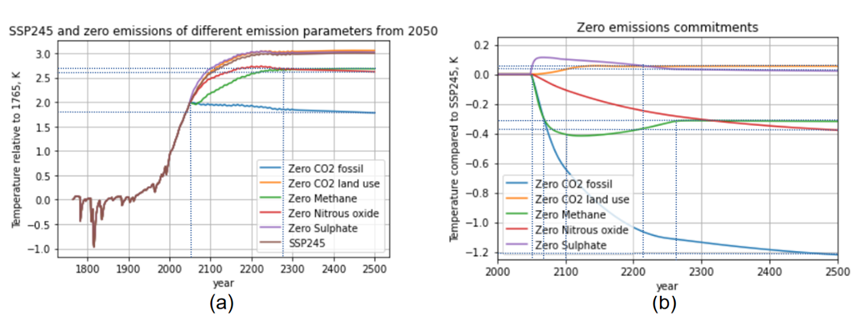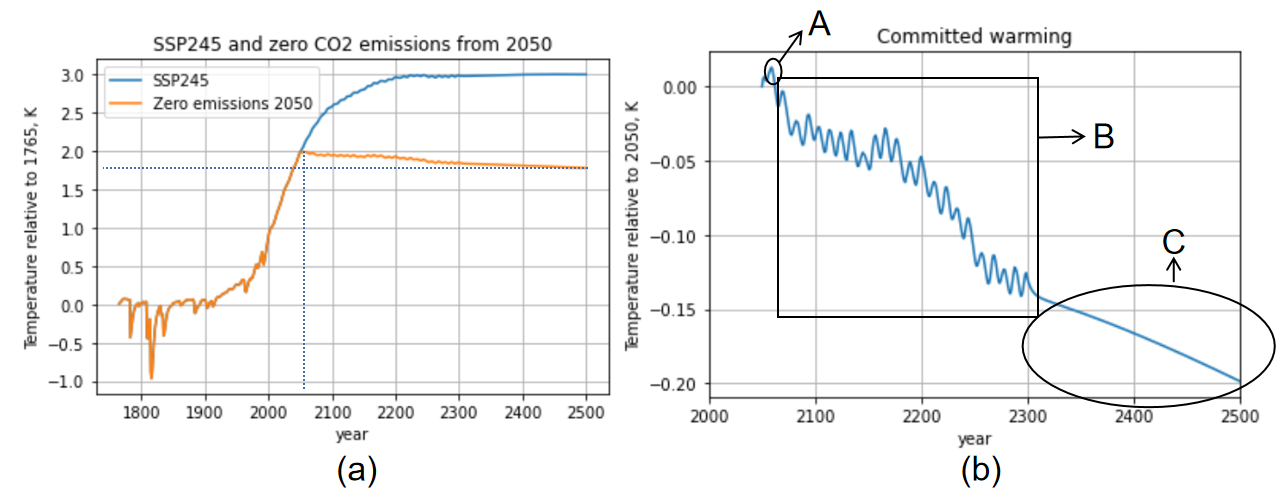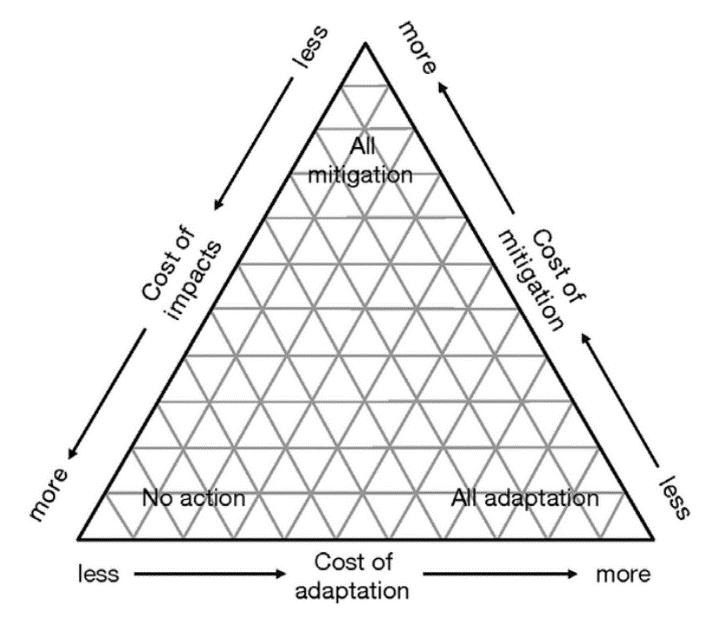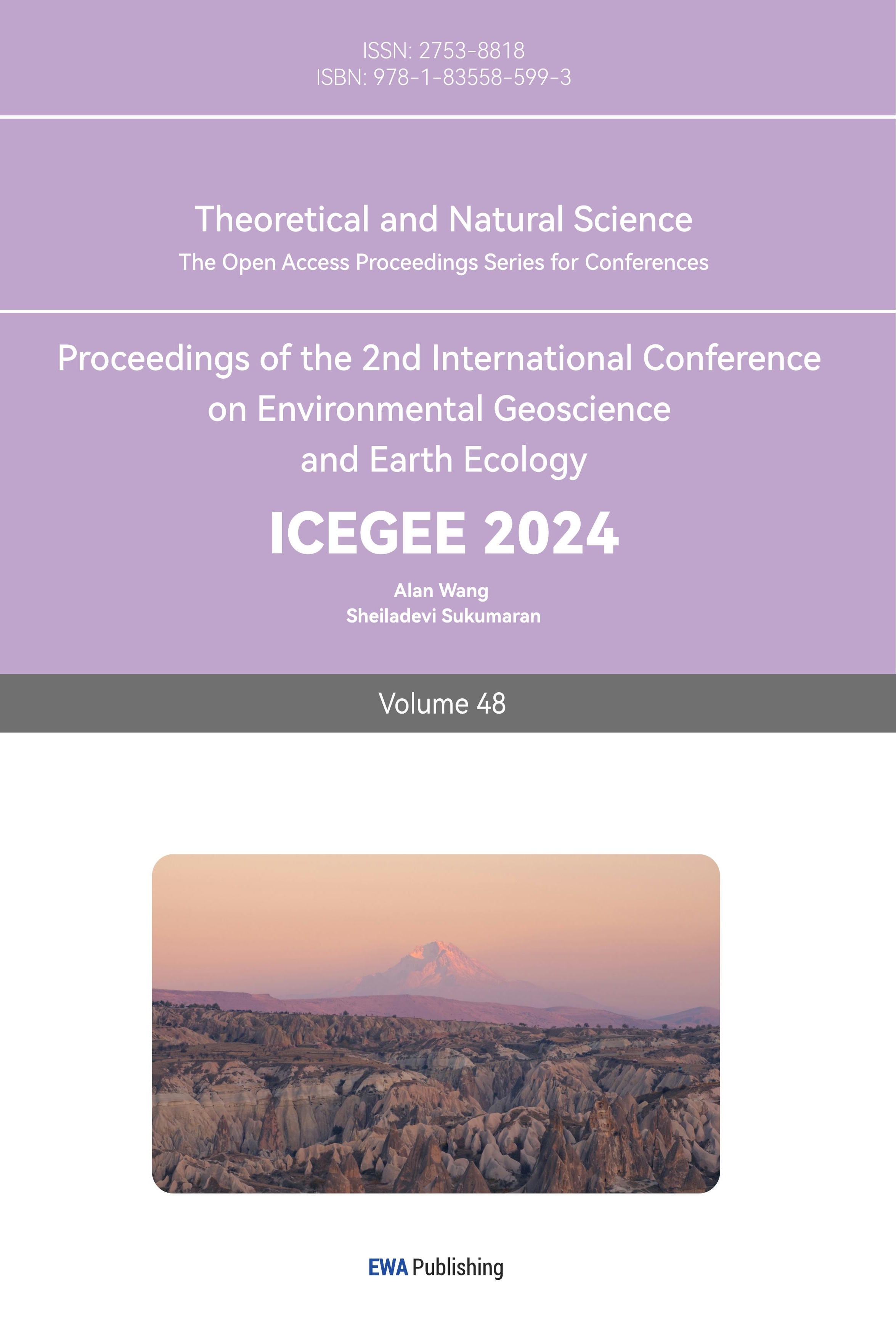1. Introduction
Global warming has been a huge climate problem around the world. Intergovernmental Panel on Climate Change (IPCC) uses CMIP model to simulate the temperature anomalies and it shows that the world has a long-term warming tendency due to higher climate sensitivity and stronger radiative forcing.
Global warming is the result of human actions [1]. Human activities, particularly the burning of coal and oil, warms the planet by dramatically increasing the concentration of heat-trapping gases in the atmosphere. The more of these gasses’ humans pump into the atmosphere, the warmer the planet will become in the coming decades and centuries [8]. Along with human activities, global warming is changing people’s way of life, bringing more and more problems. IPCC points that although without the natural greenhouse effect, the average temperature of the earth’s surface would fall below freezing and human life would not exist. But human activities such as burning fossil fuels and deforestation greatly amplify the natural greenhouse effect, which causes global warming. IPCC also points that in the past century, cars, airplanes, power plants and factories burned a large amount of coal and oil, emitting a large amount of CO2, enhancing the greenhouse effect, and leading to the increasing temperature anomaly. The burning of fossil fuels releases carbon dioxide, which is an extremely long-lived greenhouse gas [4] that can remain in the air for hundreds of years or more, this can also make the global warming a long threat.
To control the trend of global warming, Paris Agreement in 2016 decided to set a global warming target. The Paris Agreement, signed by 178 parties around the world, is a unified plan for post-2020 global action on climate change. The Long-term goal of the Paris Agreement is to limit the rise in average global temperatures to less than 2°C above pre-industrial times and to try to limit the rise to 1.5°C.
Net zero is what most countries are trying to achieve. Net zero means greenhouse gas emissions are close to zero, and most countries, such as the United States, China, have decided to meet that target by 2050.
This paper mainly explores the impact of various emission parameters on global warming respectively, and discusses whether and how net zero, especially net zero CO2, is effective on global warming.
In this paper, a simple climate model FaIR used in IPCC is used to simulate temperature anomaly when different emission parameters are set to 0, and to discuss whether global warming can be mitigated when carbon dioxide emissions are 0 which can also be called net zero CO2. In addition, this paper also explores the relationship between mitigation and adaptation. Finally, some limitations of this model and experimental setting are discussed.
2. Methods
2.1. An introduction of FaIR
The Finite-amplitude Impulse Response (FaIR) model is a simple climate model which calculates main three datasets: temperature, radiative forcing, and greenhouse gases. It can provide temperature projections in the future years [5]. FaIR converts greenhouse gas emissions and short-term climate forcing into effective radiative forcing by accumulating carbon absorption and rising temperatures to get a carbon cycle [6], and then presents them to temperature anomalies (Shindell and Smith, 2019). FaIR can use data from 1880 to 2016 to do a range of temperature projections under different scenarios [5]. It can calculate not only greenhouse gases but also short-lived climate forcers such as aerosols and black carbon on snow, in addition, the model can also calculate minor GHGs [5]. FaIR can make several predictions about future temperature changes, which can be used to study the effects of different emissions and their contribution to climate warming [3].
This paper uses FaIR model under Shared Socio-economic Pathways (SSP) to do temperature projections after reaching the goal of net zero CO2 at 2050. IPCC AR6 mainly introduces four SSP scenarios: SSP1-1.9, SSP1-2.6, SSP2-4.5, SSP3-7.0, and SSP5-8.5. In the SSP label, the first number represents the hypothetical shared socio-economic path and the second number represents the approximate global effective radiative forcing (ERF) by 2100. As emissions are set for 2050, SSP2-4.5 is selected in this article, because SSP2 has the characteristics of the current environment, and the ecological economic market has not changed significantly.
2.2. Comparisons of different emission parameters
The first step for the study is to compare different emission parameters in the model. Different emission parameters (Table.1) are set to zero to estimate the temperature anomalies and compared with the original temperature projection from SSP2-4.5. By comparing temperature anomalies, it is possible to determine which emission parameters contribute most to global warming. There are 39 different greenhouse gases and short-lived climate forcers in the model, here this study only focuses on 5 main parts of greenhouse gases: CO2, Methane, Nitrous oxide, and Sulphate.
Table 1. Different emission parameters in FaIR | ||
Column in FaIR | Emissions | Effects |
1 | CO2: fossil fuel | CO2 forcing |
2 | CO2: land use change | CO2 forcing, land use forcing |
3 | CH4 | Methane |
4 | N2O | Nitrous oxide |
5 | Sulphate | Sulphate |
2.3. Set FaIR for net zero CO2
The goal of net zero CO2 is to reach the zero emissions of CO2 in 2050. In this model, the emissions of CO2 from burning of fossil fuel and land use are both set to 0, so that the temperature prediction after net zero emission can be obtained. Since emissions are set to zero after 2050, equivalent to an abrupt halt, committed warming can be applied to look at the warming effects of different emissions. Committed warming describes the effect of historical emissions on future warming, usually by how much warmer they would be if emissions are suddenly stopped [6]. Temperature projection for zero emission of CO2 is compared with the temperature projection in 2050 to get the committed warming. The committed warming can illustrate the effects of net zero CO2 on global warming in the future.
3. Results and discussions
3.1. Effects of different emissions on temperature
By setting different emission parameters to 0, the effects of different emissions on temperature can be obtained. In Figure.1(a), compared to the temperature anomaly projections from SSP2-4.5, the CO2 emission from fossil fuel has the greatest impact on the temperature among those emissions. The temperature anomaly increases to 2°C at 2050, zero emission of CO2 from fossil fuel after 2050 can reduce the temperature anomaly apparently and at 2500, the temperature anomaly decreases to around 1.8°C. The emission of Methane has more impact on temperature than Nitrous oxide before about 2275 and both increases the temperature anomaly. After 2275, the effects on temperature of the two emissions become stable and the temperature anomaly remains 2.6°C, but the temperature anomaly is still lower than the projection from SSP2-4.5. For the emission of land use and Sulphate, they both have the similar tendency with SSP2-4.5.
The temperature difference compared to the projection from SSP2-4.5 is shown in Figure.1(b). The zero emission of CO2 from fossil fuels has the largest temperature difference after 2050. Compared to the temperature projection from SSP2-4.5, the zero emissions of fossil fuel would reduce the post-2050 climate anomaly by about 1°C when it comes to 2200, and then the decrease tendency becomes stable and when it comes to 2500, the temperature anomaly can reduce 1.2°C. The zero emissions of Methane have the similar decreased tendency with fossil fuel before about 2065. After 2065, the effect of zero emissions from Methane on the reduction of temperature anomaly becomes smaller, and the temperature anomalies gradually increase again after decreasing by 0.4°C at about 2100, and then remain stable at about 2260. After 2260, zero emissions of Methane remains stable and the reduction of temperature anomalies remains 0.3°C. The zero emission of Nitrous oxide leads to a decline in temperature anomalies, which could be reduced by about 0.38° C at 2500. For the emission of land use and Sulphate, they both lead to a small increase in temperature anomalies after setting to zero at 2050 and begin to stabilize by about 2210. After 2210, the increase of the temperature anomaly for the two zero emission parameters remains by around 0.15°C.
It is evident in Figure.1 that the emission of burning fossil fuel has the biggest impact on global temperature while the emissions of land use and Sulphate has the least impact. Net zero CO2 is to make the CO2 emissions to 0 so that the temperature anomaly can be controlled. Fig.1 shows that net zero CO2 is a useful method for controlling the global warming because CO2 is a main factor in global warming [1]. Al-Ghussain (2018) [1] mentioned that although Methane and Nitrous oxide are more capable of absorbing radiation, they do not contribute significantly like CO2 to global warming because there is lower concentration in the atmosphere than CO2 [1]. This is also consistent with the trend shown in the Fig.1. Net zero requires greenhouse gas emissions to be close to zero, so the best thing to get there is to reduce CO2 to net zero.

Figure 1. The temperature anomaly projection with different zero-emission parameters after 2050.
Brown line is the temperature anomaly projection from SSP2-4.5, the purple line is the temperature projection by setting Sulphate emission to 0, the red line is the temperature projection by setting the Nitrous oxide emission to 0, green line is the temperature projection by setting the Methane emission to 0, the orange line is the temperature projection by setting the CO2 emission from land use to 0 and the blue line is the temperature projection by setting the CO2 emission from fossil fuel to 0. Fig.1(a) The temperature anomaly projection from SSP2-4.5 and zero emissions of different emission parameters from 2050. Fig.1(b) The temperature anomaly difference compared to the projection from SSP2-4.5.
3.2. The effect of net zero CO2 (zero CO2 emissions) on temperature
The CO2 emissions from burning fossil fuel have the greatest impact on global temperature (Figure.1). Net zero CO2 is to reduce the CO2 emission to 0, so after reaching the goal of zero CO2 emissions in 2050, the tendency of temperature anomaly has an evident transition, and the temperature anomaly is much smaller than that from SSP2-4.5 (Figure.2(a)). The temperature anomaly increases to 2°C around 2050, when it comes to 2500, the temperature anomaly reduced about 0.2°C (Figure.2(b)).
Compared to the temperature in 2050, the decreased tendency has three parts. At the beginning (A in Figure.2(b)), the temperature anomaly will still increase slightly. The temperature anomaly will increase about 0.0.025°C at 2060. Smith (2016) discusses that Because the model uses climate sensitivity that is constant over time. Patterns of surface warming change over time, and since the Eastern and South Pacific oceans have not yet experienced intense warming, climate sensitivity in historical periods may be lower than that in the future, as a result, there may be a slight increase at the beginning. Until around 2300, the temperature anomaly will have a fluctuate decrease (B in Figure.2(b)). After 2300, the decreasing tendency becomes stable, and it shows a linear decrease trend. Compared to 2050, the temperature anomaly decreases 0.2°C at 2500 (C in Figure.2(b)).
As is shown in Fig.2, net zero CO2 is effective in controlling global warming. The zero emission of CO2 can reduce the temperature anomaly gradually and the global temperature anomaly can be controlled under 2°C. Although the temperature anomaly can be reduced due to the zero emissions of CO2, the temperature is still higher than that before Industrial Revolution. The global warming is an inevitable tendency that human has to face in a long-term. Global warming can be mitigated through energy conservation and reduction of emission, but the temperature will still be higher than the original, so continuous adaptation should be made while mitigation.

Figure 2. The effect of net zero CO2 (the CO2 emissions reduce to 0) on temperature anomaly.
The blue line is the temperature projection from SSP2-4.5, the orange line is the temperature projection which sets the CO2 emissions to 0 after 2050. Fig.2(a) The temperature projection from SSP2-4.5 and net zero CO2 from 2050. Fig.2(b) The committed warming compared to the projection from SSP2-4.5.
3.3. Mitigation and adaptation of global warming
Despite the mitigation of global warming, the adaptation to global warming also can be taken in account. Al-Ghussain (2018) [1] shows three strategies: no action, mitigation, and adaptation. No action means no actions are taken to face the environmental problems. It is obviously wrong not to take measures against the serious environmental and ecological problems and this can lead to extinction and damage to the ecosystem and that is not suitable for the current environmental and social condition. Mitigation means to reduce anthropogenic heat flux and greenhouse gases so that to reduce the temperature anomaly. The reduction of temperature anomaly can help control the global warming and make the environmental more suitable for human to survive. Furthermore, adaptation is to make humans be used to the impact of long-term global warming. Many environmental problems cannot be solved totally, human still needs to face the impact of those environmental problems. Adaptation is the way for humans to improve technologies and knowledge to adapt to the long-term impact of environmental problem [1]. Figure.3 shows that the cost requirement of depending on only one strategy is the most, while the optimal cost can be achieved by combining mitigation and adaptation [1].
Focusing on either mitigation or adaptation is not suitable for the goal of sustainability and what is needed is a balanced and optimal mix of mitigation and adaptation [8].

Figure 3. The relationship between the cost of the three strategies (adaptation, mitigation, and no action) towards global warming (reprint from Figure.9 in Al-Ghussain, L., 2018[1])
3.4. Strengths and limitations of net zero CO2
Net zero CO2 is a good method to protect the environment and control the global warming.
Sokolov (2017) [7] estimates that because of the earth’s carbon cycle, marine and terrestrial ecosystems help offset some of the carbon emissions, if technologies continue to be improved to reduce CO2 emissions, global warming can be kept below 2°C after 2050 without even having to reach 0 emissions, as a result, net zero CO2 is now a policy that must be implemented.
Although net zero is a helpful way to control global warming, it still has a long way to reach the goal of net zero. Net zero CO2 requires net emissions of CO2 from human activities to be close to zero, but emissions from many energy services, such as aviation, long-distance transport, the production of steel and cement, are difficult to eliminate completely. The timing of achieving the goal of limiting global temperature anomalies to 2°C depends on the cost of technology to achieve low or net zero CO2 [7]. More advanced equipment and technology will be needed to upgrade and decarbonize these services, which may take more time [2]. Although the goal of reach net zero CO2 is set at 2050 for many countries, it may cost more time for countries to update technologies and decarbonization.
3.5. Limitations and uncertainties of the temperature projections
The setting of FaIR for net zero CO2 in this study is to set the CO2 emissions (fossil fuel and land use) to 0 after reaching net-zero at 2050, but the emission change before 2050 have not been considered. Due to the mitigation, the emission of CO2 should decrease before 2050, but the pattern of the decreased tendency has not been estimated. The sudden zero emissions after 2050 can be an uncertainty.
In addition, water vapor is mainly responsible for global warming [1]. This model does not have an emission parameter about water vapor. The goal of net zero also needs to consider the impacts of whole greenhouse gases. Therefore, the impact of water vapor on global warming can be considered in further study with more model.
4. Conclusion
Global warming is one of the most important environmental problems. This paper shows that net zero CO2 is a good method to control global warming because CO2 emission is the main factor for global warming. Despite reducing anthropogenic greenhouse gases to control global warming, adaptation to global warming can also be considered because the combination of mitigation and adaptation can reach the optimal result. In this paper, the model is set up to directly consider zero emissions after reaching the goal of net zero CO2 by 2050. Because countries may need more time to upgrade and decarbonize, the 2050 target may not be met. Furthermore, the pattern of emissions reductions before 2050 has not been explored. Further work needs to consider the time to reach the goal of net zero and the decreased tendency before reach the goal to bring the research closer to reality.
References
[1]. Al-Ghussain L. Global warming: review on driving forces and mitigation. Environmental Progress & Sustainable Energy. 2019;38(1):13–21.
[2]. Davis SJ, Lewis NS, Shaner M, Aggarwal S, Arent D, Azevedo IL, et al. Net-zero emissions energy systems. Science [Internet]. 2018 Jun 29 [cited 2022 Jan 17]; Available from: https://www.science.org/doi/abs/10.1126/science.aas9793
[3]. Ehlert D, Zickfeld K. What determines the warming commitment after cessation of CO 2 emissions? Environ Res Lett. 2017;12(1):015002.
[4]. Shindell D, Smith CJ. Climate and air-quality benefits of a realistic phase-out of fossil fuels. Nature. 2019 Sep;573(7774):408–11.
[5]. Smith CJ, Forster PM, Allen M, Leach N, Millar RJ, Passerello GA, et al. FAIR v1.3: a simple emissions-based impulse response and carbon cycle model. Geoscientific Model Development. 2018 Jun 18;11(6):2273–97.
[6]. Smith CJ, Forster PM, Allen M, Fuglestvedt J, Millar RJ, Rogelj J, et al. Current fossil fuel infrastructure does not yet commit us to 1.5 °C warming. Nat Commun. 2019;10(1):101.
[7]. Sokolov A, Paltsev S, Chen H, Haigh M, Prinn R, Monier E. Climate Stabilization at 2°C and Net Zero Carbon Emissions [Internet]. MIT Joint Program on the Science and Policy of Global Change; 2017 Mar [cited 2022 Jan 17]. Available from: https://dspace.mit.edu/handle/1721.1/111809
[8]. VijayaVenkataRaman S, Iniyan S, Goic R. A review of climate change, mitigation and adaptation. Renewable and Sustainable Energy Reviews. 2012 Jan 1;16(1):878–97.
Cite this article
Wu,T. (2024). Global warming in a net zero CO2 scenario after 2050 – a study with FaIR. Theoretical and Natural Science,48,55-61.
Data availability
The datasets used and/or analyzed during the current study will be available from the authors upon reasonable request.
Disclaimer/Publisher's Note
The statements, opinions and data contained in all publications are solely those of the individual author(s) and contributor(s) and not of EWA Publishing and/or the editor(s). EWA Publishing and/or the editor(s) disclaim responsibility for any injury to people or property resulting from any ideas, methods, instructions or products referred to in the content.
About volume
Volume title: Proceedings of the 2nd International Conference on Environmental Geoscience and Earth Ecology
© 2024 by the author(s). Licensee EWA Publishing, Oxford, UK. This article is an open access article distributed under the terms and
conditions of the Creative Commons Attribution (CC BY) license. Authors who
publish this series agree to the following terms:
1. Authors retain copyright and grant the series right of first publication with the work simultaneously licensed under a Creative Commons
Attribution License that allows others to share the work with an acknowledgment of the work's authorship and initial publication in this
series.
2. Authors are able to enter into separate, additional contractual arrangements for the non-exclusive distribution of the series's published
version of the work (e.g., post it to an institutional repository or publish it in a book), with an acknowledgment of its initial
publication in this series.
3. Authors are permitted and encouraged to post their work online (e.g., in institutional repositories or on their website) prior to and
during the submission process, as it can lead to productive exchanges, as well as earlier and greater citation of published work (See
Open access policy for details).
References
[1]. Al-Ghussain L. Global warming: review on driving forces and mitigation. Environmental Progress & Sustainable Energy. 2019;38(1):13–21.
[2]. Davis SJ, Lewis NS, Shaner M, Aggarwal S, Arent D, Azevedo IL, et al. Net-zero emissions energy systems. Science [Internet]. 2018 Jun 29 [cited 2022 Jan 17]; Available from: https://www.science.org/doi/abs/10.1126/science.aas9793
[3]. Ehlert D, Zickfeld K. What determines the warming commitment after cessation of CO 2 emissions? Environ Res Lett. 2017;12(1):015002.
[4]. Shindell D, Smith CJ. Climate and air-quality benefits of a realistic phase-out of fossil fuels. Nature. 2019 Sep;573(7774):408–11.
[5]. Smith CJ, Forster PM, Allen M, Leach N, Millar RJ, Passerello GA, et al. FAIR v1.3: a simple emissions-based impulse response and carbon cycle model. Geoscientific Model Development. 2018 Jun 18;11(6):2273–97.
[6]. Smith CJ, Forster PM, Allen M, Fuglestvedt J, Millar RJ, Rogelj J, et al. Current fossil fuel infrastructure does not yet commit us to 1.5 °C warming. Nat Commun. 2019;10(1):101.
[7]. Sokolov A, Paltsev S, Chen H, Haigh M, Prinn R, Monier E. Climate Stabilization at 2°C and Net Zero Carbon Emissions [Internet]. MIT Joint Program on the Science and Policy of Global Change; 2017 Mar [cited 2022 Jan 17]. Available from: https://dspace.mit.edu/handle/1721.1/111809
[8]. VijayaVenkataRaman S, Iniyan S, Goic R. A review of climate change, mitigation and adaptation. Renewable and Sustainable Energy Reviews. 2012 Jan 1;16(1):878–97.









